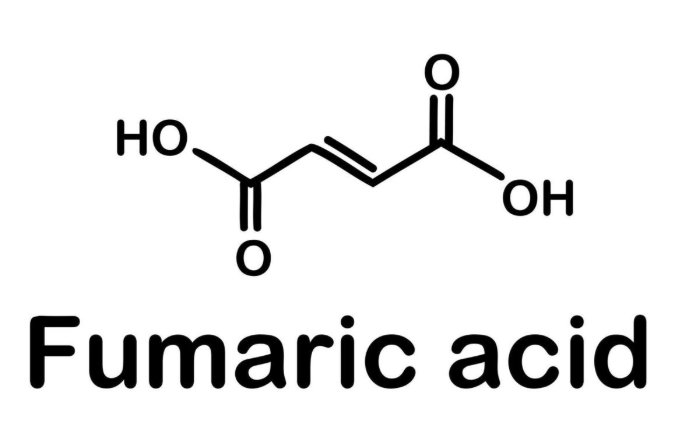In an era where consumers demand fresher, longer-lasting, and more natural food products, the use of preservatives plays a crucial role in maintaining food quality while minimizing spoilage. Among the various preservatives used in food processing, fumaric acid stands out as an effective, safe, and sustainable option.
This article delves into the role of fumaric acid in food preservation, its benefits, and how it helps to extend the shelf life of various food items.

What is Fumaric Acid?
In food products, fumaric acid is used to control pH levels, enhance flavors, and prevent microbial growth, thus playing an essential role in preserving the food. Due to its naturally occurring properties and low toxicity, fumaric acid is widely considered safe for consumption and is commonly used in organic and natural food products.
How Fumaric Acid Works in Food Preservation
Fumaric acid extends the shelf life of food through several mechanisms, primarily by acting as an acidulant, antimicrobial agent, and preservative. Let’s explore how fumaric acid functions in each of these roles:
Acidulant and pH Regulator
Fumaric acid, like other organic acids, is highly effective at lowering the pH of food products. A drop in pH contributes to the formation of an acidic environment that prevents the growth of several bacteria, mold, and yeasts that cause spoiling. This makes fumaric acid an ideal ingredient in preserving foods such as jams, jellies, fruit juices, and canned products.
By lowering the pH, fumaric acid helps stabilize the texture, color, and flavor of the food, ensuring it remains fresh and appetizing for a longer period. The acidulant properties of fumaric acid are especially important in products where the control of microbial activity is critical to prevent spoilage.
Antimicrobial Properties
Fumaric acid is known for its antimicrobial properties, which further enhance its ability to preserve food. In particular, fumaric acid can inhibit the growth of various bacteria, molds, and yeasts that contribute to food spoilage. This antimicrobial activity makes fumaric acid an essential ingredient in products that are prone to microbial contamination, such as dairy products, sauces, and pickled vegetables.
By reducing the food product’s pH and fostering an environment that is inhospitable to microbial growth, fumaric acid has an antibacterial effect. Fumaric acid can also interfere with the metabolic pathways of microorganisms, further limiting their ability to thrive and multiply.
Antioxidant Activity
Fumaric acid has been shown to exhibit some antioxidant activity, which helps prevent the oxidation of fats and oils in food products. Oxidation is a major cause of food spoilage, particularly in fatty foods like nuts, seeds, and oils. By preventing oxidation, fumaric acid helps to maintain the flavor, texture, and nutritional value of food products, extending their shelf life and ensuring they remain fresh for longer.
Fumaric acid is often used in conjunction with other antioxidants to enhance the preservation of food products that are sensitive to oxidative damage, such as packaged snacks and bakery goods.
Control of Enzymatic Browning
Fruits and vegetables frequently experience enzymatic browning, especially after being chopped or exposed to air. The polyphenol oxidase (PPO) enzyme catalyzes the browning reaction, which results in the production of unwanted brown pigments.
Fumaric acid helps to control enzymatic browning by lowering the pH of the product, which inactivates the PPO enzyme and prevents the browning reaction from occurring.
This property makes fumaric acid particularly useful in preserving the appearance and quality of fresh-cut fruits, vegetables, and salads, as well as processed products like dried fruits and fruit purees.

Benefits of Fumaric Acid in Food Preservation
The use of fumaric acid in food preservation offers several key benefits for both food manufacturers and consumers. These benefits include:
Extended Shelf Life
The most obvious benefit of using fumaric acid in food preservation is its ability to extend the shelf life of various food products. By inhibiting microbial growth, controlling pH levels, and preventing oxidation, fumaric acid ensures that food remains safe, fresh, and flavorful for an extended period. This helps reduce food waste and allows consumers to enjoy high-quality products for longer.
Minimal Processing and Clean Label
Fumaric acid is considered a “clean label” ingredient, meaning it is naturally derived or produced through simple processes without the need for extensive chemical additives or processing. For consumers who prioritize natural and minimally processed foods, fumaric acid offers a sustainable and safe option for extending shelf life without compromising the integrity of the product.
Non-Toxic and Safe for Consumption
Regulatory organizations such as the U.S. Food and Drug Administration (FDA) have declared fumaric acid to be generally recognized as safe (GRAS). It is naturally present in many fruits and vegetables, and its use as a food additive does not pose significant health risks when consumed within recommended levels. Unlike some synthetic preservatives, fumaric acid is non-toxic and does not cause adverse health effects, making it a preferred choice for organic and natural food products.
Versatility in Food Applications
Fumaric acid can be used in a wide range of food applications, including beverages, dairy products, sauces, jams, and confectionery. It is particularly useful in fruit-based products, where it helps enhance flavor, prevent spoilage, and control browning. Because of its versatility, it is a desirable choice for food manufacturers who require a multipurpose preservative.
Environmentally Friendly
Fumaric acid is typically derived from renewable resources, such as plant-based fermentation processes. Because of this, it is a more environmentally friendly choice than other artificial preservatives that need energy-intensive chemical reactions. Fumaric acid is also biodegradable, meaning that it has less of an effect on the environment than manufactured compounds that could cause pollution.
Applications of Fumaric Acid in Different Food Products
Fumaric acid is used in a variety of food products, where it plays a critical role in preserving freshness, improving flavor, and extending shelf life. Some common applications include:
Beverages
Fruit juices, soft drinks, and energy drinks frequently contain fumaric acid to boost flavor and stop microbiological growth. It helps to stabilize the pH of the beverages, ensuring that they maintain their taste and freshness for a longer period.
Dairy Products
In dairy products like yogurt and cheese, fumaric acid helps control the acidity levels, improving texture and extending shelf life. It also inhibits the growth of spoilage microorganisms, ensuring the product remains safe for consumption.
Jams, Jellies, and Sauces
Fumaric acid is frequently used in fruit spreads, jams, and sauces to control pH and preserve flavor. In addition to ensuring that the product keeps its color and texture, keeping the proper acidity helps stop the formation of dangerous microorganisms.
Pickled Products
Acidic conditions are necessary for pickled fruits and vegetables to prevent microbial growth and prolong their shelf life. Fumaric acid is often used as an alternative to vinegar in pickling solutions, providing a more natural option for food preservation.
Bakery Products
In baked goods like cakes, cookies, and pastries, fumaric acid helps maintain freshness by preventing oxidation and controlling the acidity. Additionally, it can enhance the product’s texture, keeping it supple and moist.
Chart: Comparison of Fumaric Acid with Other Food Preservatives
| Preservative | Source | Main Function | Shelf Life Extension | Food Applications | Environmental Impact |
| Fumaric Acid | Naturally derived, fermentation | Acidulant, antimicrobial, antioxidant | Moderate to long-term | Beverages, dairy, sauces, jams, pickles | Low, biodegradable |
| Citric Acid | Citrus fruits | Acidulant, preservative | Moderate | Beverages, candies, canned goods | Low, biodegradable |
| Ascorbic Acid (Vitamin C) | Citrus fruits, synthetic | Antioxidant, preservative | Short to moderate | Juices, fruits, snacks, canned foods | Moderate, depends on production |
| Sodium Benzoate | Synthetic | Antimicrobial, preservative | Long-term | Beverages, sauces, canned foods | Moderate, can be toxic at high levels |
| Calcium Propionate | Synthetic | Antifungal, preservative | Long-term | Bread, bakery products | Moderate, synthetic |
Sammary
With its many uses, including prolonging shelf life, improving flavor, and halting spoiling, fumaric acid is a vital tool in food preservation. Its antimicrobial, antioxidant, and acidulant properties make it a versatile and effective preservative for various food products, particularly those in the organic and natural food sectors. In addition to preserving food’s safety and quality, fumaric acid satisfies customer desire for clean-label, sustainable ingredients.
As the food industry continues to prioritize health, sustainability, and natural products, fumaric acid is poised to play an even more significant role in ensuring the longevity and quality of the foods we consume. With its minimal environmental impact, non-toxic properties, and effectiveness in preserving food, fumaric acid remains a top choice for manufacturers seeking a natural, efficient, and sustainable food preservation solution.
